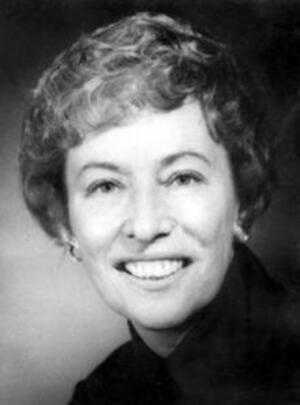Birth of Ruth Sager, innovative scientific achiever
“Science is a way of life. I think it all comes from the inside. It really gets to the very core of your existence. It is much like being an artist or a dancer. It's something that demands everything from you that you are capable of.”
Ruth Sager gave everything of which she was capable to science and got two complete careers of revolutionary achievement in return.
With no previous interest in science, at sixteen she was accepted to the University of Chicago, where Anton J. Carlson gave lectures in a survey course in biology that fascinated the young girl. She went on to get her master’s degree in plant physiology from Rutgers University and her PhD in maize genetics from Columbia in 1948. As an assistant at Rockefeller Institute’s biochemistry division, she challenged the teaching that had prevailed since the days of Gregor Mendel, “the father of modern genetics”: the idea that all genetic information lived in the nucleus of the cell. Sager’s revolutionary discovery was that important genes lay outside the nucleus in “organelles” that determined important functions such as photosynthesis and were passed along genetically to new generations.
In 1997, Dr. Lawrence Bogorad, Professor of Biology emeritus at Harvard University said, ''These days, scientists know a lot about most of the genes in the organelles. Increasing numbers of human diseases that result from mutations in genes in respiratory organelles are becoming recognized. These discoveries are direct results of the change of thinking about the problem that Ruth's work brought about.''
Sager became a research associate at Columbia University in 1955. Her research there led to her conclusion that non-chromosomal genes might evolve before DNA chromosomes and that they might more closely resemble early cellular life. She was rewarded with a promotion to senior research associate, during which time she published the textbook Cell Heredity. She accepted a position as full professor at Hunter College in 1966, eighteen years after receiving her Ph.D. degree.
But after all these achievements, changes were about to come. After marrying in 1974, she became one of the first female full professors at Harvard University in 1975 and began work as the head of the Division of Cancer Genetics at Dana-Farber Cancer Institute. Researching how cancer cells grow, multiply, and degrade chromosomal stability, Sager theorized that tumor suppressor genes might be the secret weapon halting the growth of cancer. She pioneered work in recombinant DNA technology, gene splicing, and cell cloning at Harvard for 22 years.
When she died of cancer in 1997 in Brookline, MA, Arthur Pardee of the National Academy of Sciences wrote, “her career twice demonstrated that some of the best science needs faith and support of novel ideas from the most creative minds.”
As Ruth Sager said herself, “I have always been intrigued by the physicists' approach to scientific inquiry, particularly in the fact that the way to find out something really new is to question the basic tenet of existing theory.”
Sources: “Dr. Ruth Sager, 79, Researcher on Location of Genetic Material,” New York Times; “Ruth Sager,” The National Academies Press; “Ruth Sager,” Answers; “Ruth Sager, Faculty of Medicine – Memorial Minute,” Harvard Gazette; Jewish Women in the Sciences, C. A. Bierman and R. K. Rose, Greenwood Press.




prof premraj pushpakaran writes - 2018 marks the 100th birth year of Ruth Sager!!